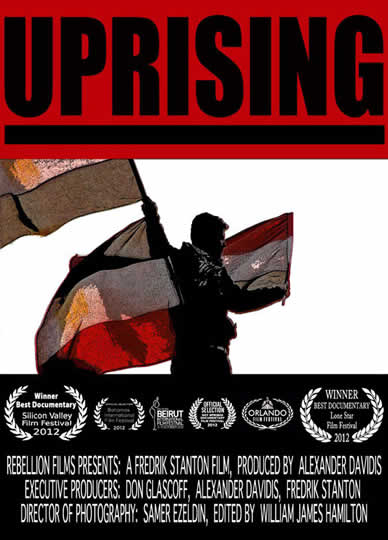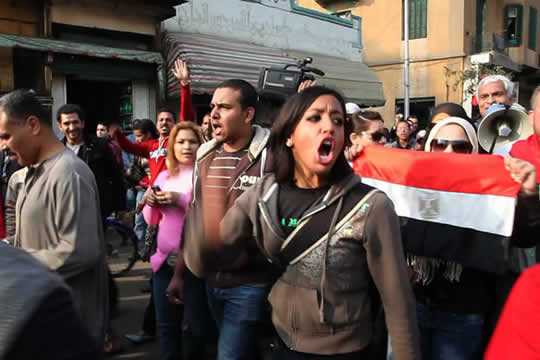 Fredrik Stanton’s “Uprising” documents the Egyptian revolution. Interviews with the chief organizers (including four Nobel Peace Prize nominees) mixed with archival footage and amazing hand held, cell phone and video footage shot in the streets bring the chaos of history alive. The film’s premiered at Egypt’s Alexandria Film Festival, November 2012.
Fredrik Stanton’s “Uprising” documents the Egyptian revolution. Interviews with the chief organizers (including four Nobel Peace Prize nominees) mixed with archival footage and amazing hand held, cell phone and video footage shot in the streets bring the chaos of history alive. The film’s premiered at Egypt’s Alexandria Film Festival, November 2012.
Books by Gene Sharp, the world’s foremost expert on non-violent revolution, influenced Egyptian organizers. The central message preached by Sharp is that “the power of dictatorships comes from the willing obedience of the people they govern. If the people can develop techniques of withholding their consent, a regime will crumble.” Stanton had described the 20 million strong protests as “a pure example of Gandhi’s concept of satyagraha.”
January 2011/ Arab Spring/ Egypt. Following the Tunisian Revolution that ousted President Zine El Abidine Ben Ali, spontaneous demonstrations erupted in Cairo’s Tahrir Square leading to the overthrow of the regime of President Hosni Mubarak who ruled Egypt under martial law since 1981.
Largely non-violent demonstrations, marches, acts of civil disobedience and labor strikes brought down the regime. Millions of demonstrators from all socio-economic and religious backgrounds demanded the overthrow of Hosni Mubarak.
Brave modernist activists, often communicating through Facebook, Twitter cell phone and other Social media tools, organized non-violent mass demonstrations. They signaled Egypt’s desire to join the modern world, in defiance of region-wide Islamist regimes and terrorist forces. Like Vietnam and the Fall of the Berlin Wall, media became the grassroots link. The Revolution Will Be Televised, 3.0. This was trickle down of the most progressive kind. The privileged class, who were wired, spread the message through the general society. Flash Mob as Revolution had arrived. Media savvy young adults led the charge.
Music nerd Khaled Said, who spent his days downloading from the Internet and distributing it, accidently discovered police footage showing the cops of the SIdi Gaber police station dealing hashish. He posted it online. Within days, informers turned him over to the police, who savagely beat him to death in front of neighbors. He face was destroyed,
Wael GhonI’m founder “We Are All Khaled Said” facebook page) posted his picture. The handsome young “everyman” who reminded everyone of some member of their family became the flashpoint. Enraged activists called for a protest on Police Day, Jan 25. The blogged, twittered Flckred, None of them were prepared for the over millions who took to the streets over the days of the uprising, Christians, Muslims, students, professors and mothers in headscarves all hit the streets.
Twenty-six-year-old Asmaa Mahfouz posted a radical video blog. “I could not be silent and I had to make a video that could touch everyone. I went to an office near Tagir Square shot a video and posted it on YouTube.” Calling on honor and dignity, Mahfouz’s viral video was largely responsible for the enormous crowds. “If you think yourself a man come down with me on Jan 25th, demand your rights, my rights, your family’s rights. I’m going down on Jan 25 and I will say NO to corruption, NO to this regime!”
They announced the date on Facebook, eleven days before it was due to begin. Activists answered the Facebook invitation, replying whether or not they would attend. Jokes abounded: “What’s the dress code? What’s the couple policy and where is the After Revolution party? ” During the protest Facebook kept everyone informed of the moment to moment action of the protestors, the police, and the Army. Live social media inspired more action.
Jan 25 was a non-violent protest. On the 26th Mubarak shut down the internet and cell networks. Parents rushed to the streets in search of their student protestors and joined the rebellion. Police crackdown began on he following days, but the Genie was already out of the bottle. Emboldened protesters stormed the police, phalanxes were beaten, arrested or shot but the kept coming. Eventually the police and military stood down, vastly outnumbered.
At least 846 people were killed and 6,000 were injured in clashes with security forces.
Few recognized at the moment that they were making history. On witness climbed to a vantage point only to realize that a simple demonstration had become a revolution. Politicians, diplomats, academics and members of the Old Guard, the original bloggers who used the Internet to activate the uprising gave witness to the chaos of history. Passion, commitment and shock fill their stunning accounts.
Hani Shukrallah managing editor of Al-Ahram, Egypt’s largest newspaper, Gigi IbrahI’m (Activist Blogger-Citizen Journalist), Blogger Mahmoud Salem (“Rantings Of A Sandmonkey”), Heba Moryef of Human Rights Watch, Ambassador Edward Walker, activist Nadine Sherif (Cairo Institute for Human Rights Studies), Asmaa Mahfouz, Esraa Abdel Fattah (“Facebook Girl”), and Mohamed Adel (co-founders of the April 6 Youth Movement). Hossam Baghat (Founder Egyptian Initiative for Personal Rights), Amr Moussa Former Secretary-General of the Arab League/ Former Egyptian Foreign Minister. During the uprising polls showed Moussa as the most popular candidate for office.
Gigi IbrahI’m, a graduate from the American University in Cairo shot footage from the first march on Police day. Dr. Ayman Nour, Chairman of the El Ghad party, spent 4 years in solitary when he came in 2nd in the 2005 elections.
Actor Amr Waked (whose presence in the demonstrations drew many to join him) recalled that he turned and realized he was leading thousands through a barricaded corner. A policeman came up to the actor, “”lease don’t break anything, please don’t burn the shops.” Waked replied. “This is our country, our assets. We won’t destroy them. We don’t want to inherit a burned down place, so just trust us.” The outnumbered police let them through.
UPDATE: Friday, Jan. 25, 2013. Two years after Egypt’s revolution began, protesters returned to Tahrir Square. Liberal, secular opposition denounced Islamist President Mohammed Morsi stating the goals of the pro-democracy uprising have not been met. Protestors clashed with riot police.

